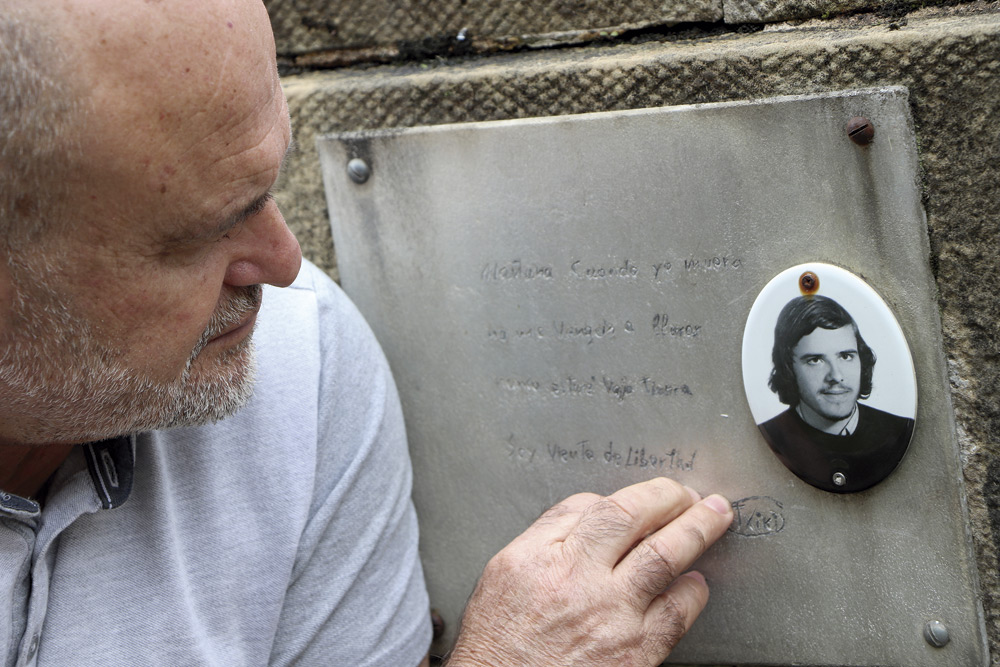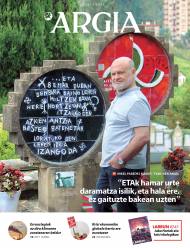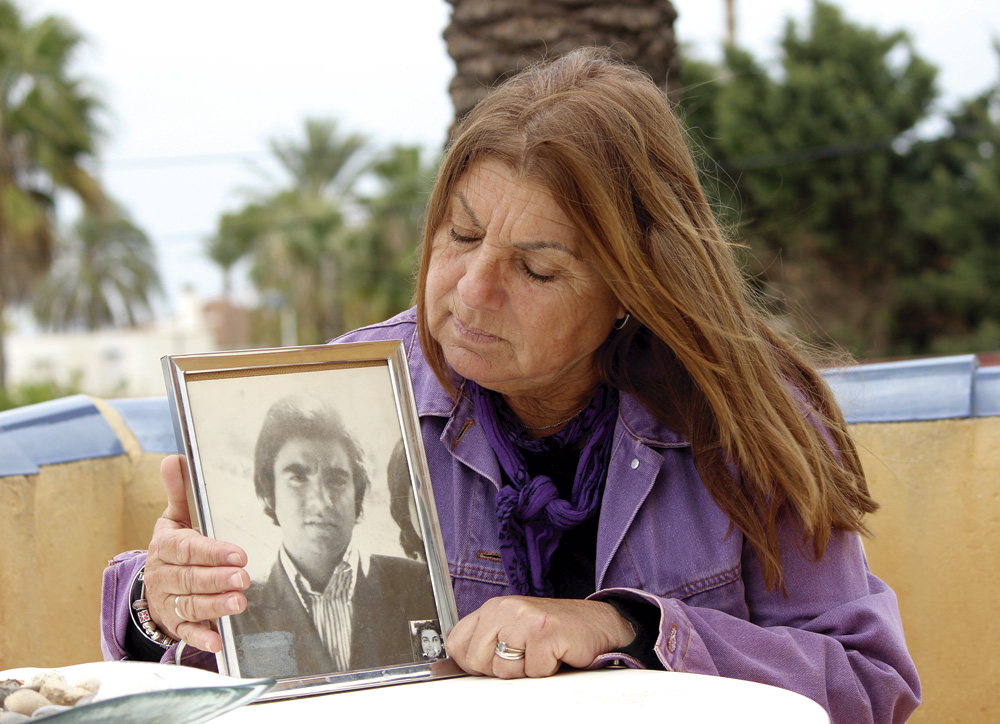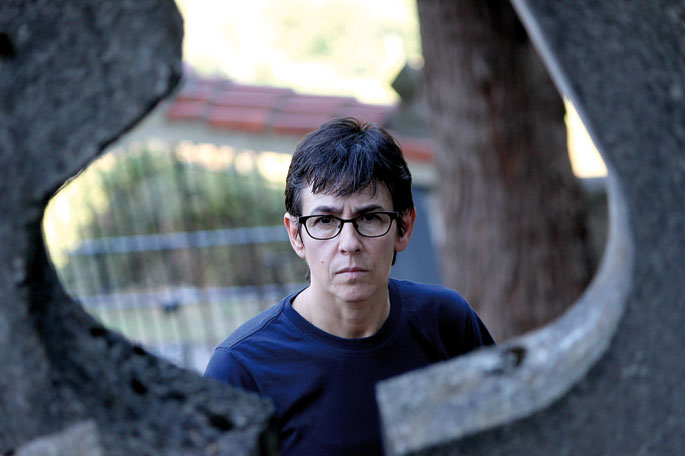"They're so crisp, they don't know what idealism is, they're not thirsty for freedom."
- 27 September 1975. Franco agonizes, already appointed as a substitute for Juan Carlos I de Borbón. Five shot: Txiki, Otaegi, Sánchez Bravo, Baena, García Sánchez. Mikel is the brother of Jon Paredes Manot Txiki. His brother was shot in Cerdanyola, Barcelona, with his eyes fixed.

Julen Lekuonaren kantua iduri, gurasoak eta zazpi senideko familian, zaharrena izan zen Mikel. Ondoren etorri ziren Jon, Guadalupe, Diego, Isabel, Kepa eta Perdi anai-arrebak. Jon galdu zuten, Txiki, eta hezur-mamiraino markatu du horrek sendia, oro har, eta Mikel bera, oroz gain. Glencree ekimenaren bigarren aldian parte hartu zuen 2008an. Hainbat ikastetxe eta unibertsitatetan izan da bere lekukotasuna eskaintzen. Hamaika neke eta pena, min eta arantza, berriz, nahiago ditu bere golkorako gorde.
You saw how your brother was fueled.
Yes. I was ten yards away from me. He was 23 years old and Jon 21. He was a boy, for example. There it is in the pictures. Young, idealistic, because idealism was the most important thing we had then in this country, the only way to oppose the wave of injustice. People who were starting to fight clandestinely knew it, they knew that one day they were free, but the next day they could witness it. There were a lot of people fighting, some names have appeared, not those of others, some have been arrested, some have not, fortunately. And I think, as then, that we have to try for this people. Of course, now I'm not 23, but 67, I have life experience, I've met a lot of people. Some of them are considered Superman, or have the habit of acting as if they were ayatolas…
A large number of men joined the fight. Among them, Jon; among them, you.
Since then I have fought one way or another. I have never said anything, until Glencree [several victims held meetings in the peace process of the Basque conflict to promote justice, memory and coexistence]. When I was asked to participate in Glencree, I thought something had to be done, and although some did not see my participation with good eyes, I participated. I thought something had to be done, because we don't have real power, because Vitoria's power is nothing more than what Madrid borrowed: “Today give it away, tomorrow take it away.” We have to do everything we can to attract people, to form a large majority and, with the majority, to go to Madrid and say: “Listen to us or you will see what you cannot see!”
Like the Catalans?
Like the Catalans, but more sweet. And always without violence. It's not possible by force. I am much more afraid of state violence than of any violent movement that can be built in Catalonia or the Basque Country, because the State is able to assemble another GAL, or two, as it did before, and also “with all legitimacy”. What legitimacy? We have no more than the word, we have to be honest with Europe, to be recognised as a people. I think the Catalans should also go out there.
Jon became fully involved in the fight, entered ETA. And you? You were my older brother.
I didn't get in.
“You didn’t get in... How did Jon get in?
The environment attracted them. Injustice was then justice. Jon discovered that there were people in his crew and decided to go down that road. In the village they formed several groups that acted separately, without ties. When a group of people fell, they caught three or four people, not anybody else. So Jon started. One day he hid and a year later he was captured.
How did you know it had been hidden?
When the civil guard came to search for us at home. “Where is your son?” they asked our mother. And my mother, petrified. “He’s gone camping.” Let's not talk! In 1974, ETA recalled the kidnapping of [Luis] Gómez Acebo [the husband of Pilar de Borbón] to release prisoners from Spanish prisons in return. The commands didn't stop grinding. Three or four commands went to Barcelona, each by their side, and suddenly Jon was surprised.
That year [1975] I met him in Altsasu. He said to me: “Miguel, I’m going to Perpinyá, I won’t see myself for a while. I'm going to tell you when you come back from there." I didn't ask him anymore, because it wasn't convenient to know. When you are questioned by a civil guard or police officer, you also start to tell what you do not know. As he was heading to Perpignan, he told me that he would tell me back, but he didn't come back. We read in the newspaper that they were arrested in Barcelona. They lasted for a week or ten days. As was his custom, he had been tortured harshly. They did what they are and are not, what they did to everyone else, and with more rage Jon, who was not born in Euskal Herria, because he was the son of the migrants. That was what the civil guards told me when I was arrested in the Pyrenees.

When did they stop him?
I guess one month after Jon's shooting. When my brother was shot, I came from Barcelona to Zarautz yes, but I did not go home. Just in case. I took refuge in friends' house. I spent a month with them. One day I told them that I was going to the mountain, it was the exit of the Oargi mountaineers association of Tolosa, to the Pyrenees. We went on the bus. We climbed through Jaca, stood up, got off the bus and set off on foot, climbing the mountain, and then, the civil guards! We shoot at the air to stop. We were laid on the ground. We were arrested four, after asking for identifications. The police had signed us up, apparently. I didn't know the other three. However, I know that one of them was deaf to blows. As far as I am concerned, the civil guards brought me from Jaca to Pamplona. They attacked me, insulted me, insulted me, insulted me against my brother and sent me to him. A month after Jon's shooting, but against him, yet. And to me, the wood. What a shock! In Pamplona, I was left in the hands of the police and in San Sebastian.
To San Sebastian, where?
To the civil government. It was a small room, full of smoke. They would circle and push me back and forth, punched. Finally, they came out of the room, in a closet, in sight, with a gun. I saw it. I don't know what they were proposing for me to look for that weapon, which I had the gun in my hand to kill me. Every half an hour, on top, in the cell, he would give a mattress, and on the bottom. They held me back for four days. And then they released me. The news appeared in Change 16 magazine in October of the same year. I was released, but I didn't go home. I stopped in San Sebastian.
What steps did they take after Jon's arrest?
He was arrested at the end of July 1975. First, they said they had to make the ordinary trial, charged with bank robbery. It was said that he had also been the perpetrator of the murder of a police officer, but it was not at all clear. At the same time, two other policemen were also murdered, one in Barcelona and another in Madrid, and what was an ordinary trial, became sumarisimo, as both ETA and FRAP were in a climate of war. Several militants were arrested, held in the form of trials and, among them, many were sentenced to death by the judges. People in Europe opposed this, there were harsh protests across the country and, finally, five death sentences were passed. Among them, Jonen. They say that he was not born in Euskal Herria, and that in the state he wanted to intimidate colleagues from other countries. They're so crisp, they don't know what idealism is, not the thirst for freedom. That is why they went to America and razed all the peoples.
Marc Palmes and Magda Oranich were your lawyers.
Juan Mari Bandrés and Miguel Castells made us that path. The other two defendants, Marc and Magda, defended Jon in Barcelona. Willingly. They were young and very on our side. Mother and Aunt Paulina went to Barcelona and stayed there in the house of the family Pons Llovet. His son Josep Lluis participated in the flight of Segovia. The Pons Llovet family helped us a lot. Even after Jon's death, our brother's coffin was buried in his tombs until we were able to bring the coffin into the northern cemetery.
The mother was present at the trial.
Yeah, a pantomime. Even then he saw Jon.


Below, in Donostia, that same year, a demonstration in tribute to Txiki and Otaegi. Photo: Archives: Argia.
The mother said she had seen symptoms of torture, that she had approached kissing her and seen her bruises.
Yes. It is a question of the day of trial. They did everything: the bathtub, they hung it, they hit all sorts of blows, they threatened forever… The mother and aunt were in the trial and then they returned to Zarautz. They came and I went to try something, to ask for justice, in the realm of injustice. There was a sentencing, there was no turning back. Jon himself told me in the evening chapel: “These are not going to yield.” In the evening chapel, about torture, he said something else to me: “They have made me say whatever it is, but I have not denounced any friends!”
Who were you in the night chapel?
Marc [Palmes], Magda [Oranich], Captain Coronado, military attorney, several officials and others. I would have wanted it to be an unfinished night, but it happened quickly. We spent the night talking about nonsense, to avoid what followed. Nevertheless, I could not take the dawn out of my head. On the other hand, Jon himself was quiet. I don't know if you realized death, I don't know if I would, too, or I don't know if, simply, I was really conscious and I was willing to go ahead. I don't know.
It took off the day.
And we left Modelo prison, crossing the Diagonal, surrounded by civil guards and policemen. Terrible. I think they also wanted to scare the Catalans. About five kilometers from there, Cerdanyola, the cemetery, and there the forest, the Spanish army. For a while, Jon squandered, made a small widening and was placed in the center. There was also a Red Cross ambulance and a prison van. When everything was ready, we went up to open it, lawyers, myself… There was Jon, tied. When she saw me, Eusko gudariak started singing. In the nearby forest, screams were heard: “Txikiiiii…! ! Chin...! ! Gora Euskadiiiii! But they fusified it. And if the lawyers hadn't held me up, I would have taken off one of the guards' rifles and shot them. One of those dog children began to say: “This won’t fire any more!”
Militants from Barcelona screaming in the forest.
Yes. Of course, there were a lot of controls and they were prevented from accessing the area, but their screams came. Then those people went beyond the controls and entered the cemetery. There we wanted to say goodbye to him and open the coffin. It was then that Marc [Palmes] took Jon's picture with a small camera. Someone had seen him and at the exit the police had removed Marc's camera, but had already saved the roll. Ordinary people in the cemetery. And the same way in the afternoon. A mass of the dead was held, followed by a strong protest. I have a very good memory of the Catalans, and I do not care what their flag is, because in the face of injustice there is no flag on either side.
You saw Jon being shot. What is trauma?
There. It's hard to beat. You can never forget. We weren't in war, right? And instead, Jon was killed as if we were in war… That gives you an idea: if you are able to do it, what will you not do on another occasion? Now, ETA has been silent for ten years, and yet they don't leave us alone: by making real decisions, they don't let us really govern.
To what extent does this mark?
Totally. It marks you in life, it marks you in work, when it marks you… I was municipal police and I always tried for my people. Some, some ayatolas, did not understand that I entered the municipal police at that time, what were my reasons. And yet, it has also happened to me that I am being held at the civilian guard's headquarters dressed as a police officer, for supporting a demonstration at such harsh dates. No, now it is mandatory for the Municipal Police to support the demonstrations.
What did Jon and you look like?
I was two years older than him, more serious than him, more fiery than me. It was obvious. He scolded him. “Jon, you fall, they will catch you, it will not last for a second.” And it didn't last for a second. He didn't listen to me. But anyway, maybe it's the result that I'm still here.
That's how you told us a lot, Miguel. But how much have you kept us?
More...

to the new pantheon. Photo: Archives: Argia.
“Behin baino gehiagotan joan behar izan dut Zarauzko guardia zibilen kuartelera, udaltzain lanak horretaratuta. Tartean, jende ‘normalarekin’ tratatu dut han. Beste batzuetan, euskaldunoi eta euskal den edozeri amorrua dieten guardia zibilekin. Horiek ez ditut hemen nahi, ez guardia zibiletan, ez gainerako polizietan ere”.
“Gazteek ez dakite gertatu zaiguna. Ikastetxe eta unibertsitateetara joan ohi naiz, gure historia kontatzera, Jonena eta gurea. Eta gazteak negar malkotan, hantxe, nire aurre-aurrean. Eta beti esaten diet: ‘Egin gure herriaren alde, baina bortxarik gabe. Erabili burua, herri honetan argiak gara-eta. Erabili burua, osatu gehiengoak, gauzatu gure asmoak’. Inportantea da historia kontatzea, historia bat bera, nork bere ikuspegitik”.
“Eta behar dudan
denbora baino lehen
hiltzen banaute
nere hortzetan itzaliko den azken antzia
beste batenetan
loratuko den
lehen irria
izango da.”
(Joxean Artzeren ‘Nahiz eta heriotza’ poema zatia, Jon Paredes Manoten hilarrian)
Irailak 27, krimenaren +42. urtea. Gezurra dirudi Bartzelona urrunean abokatu zahar bati eztarria korapilatzea, euskaldunok espektakulutan entreteniturik gabiltzan bitartean.
Tramitera ere ez dute onartu auzitegiek eskaera. Azpeitiko Udalak eta familiak frankismoaren krimenen kontrako Argentinako kereilara batuko dute kasua.
Haren hilketaren erantzuleak zeintzuk diren argitzea eta horiei ardurak eta erantzunkizunak eskatzea nahi dute. Horretarako, sumarioaren kopia bat eskuratzea nahi dute. Bidea "zaila" izango dela azaldu du Angel Otaegiren familiako abokatuak, baina "merezi"... [+]


















